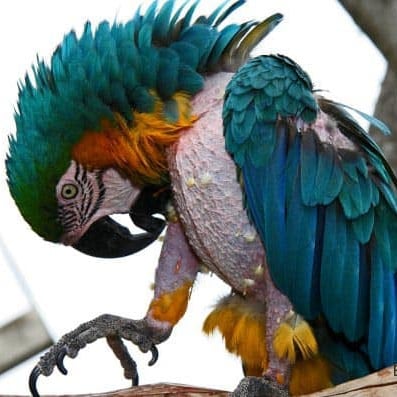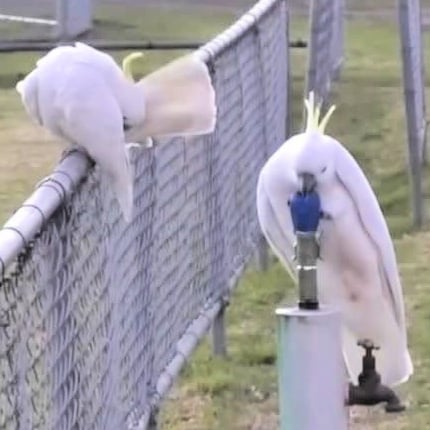Parrots are some of the smartest and most colorful birds in the world. Many people love to keep them as pets, and lots of zoos and breeding centers have parrots, too.
But here’s the problem: not all parrots live well in cages or homes. Some parrots are happy and healthy, but others get stressed, bored, or even sick.
Scientists wanted to understand why this happens, so they studied over 100 different parrot species to look for clues.
What Did the Scientists Study?
The researchers looked at two big things:
1. How well do parrots breed in captivity (like in zoos and breeding centers)?
2. How parrots behave in homes (as pets).
They collected information from thousands of parrots. They checked how many chicks hatched in breeding centers, and they watched how pet parrots behaved at home.
They were especially interested in weird or harmful habits, like parrots plucking out their own feathers or repeating the same movement over and over again (called stereotypic behaviors).
What Is Stereotypic Behavior?
Stereotypic behavior means doing the same thing again and again, even if it doesn’t make sense. For parrots, this can be:
– Biting or chewing the cage bars
– Repeating the same noise or movement
– Plucking out their own feathers
These behaviors are usually a sign that the parrot is bored, stressed, or unhappy. It’s like when a person chews their nails or taps their foot when they’re nervous or bored.
What Makes Some Parrots More Likely to Have Problems?
The scientists found two big reasons why some parrots struggle more than others in captivity:
1. Intelligence
Parrots are known for being super smart. Some can solve puzzles, talk, or even count! But the study found that the smartest parrots (the ones with the biggest brains for their body size) were actually more likely to have problems in captivity. These clever parrots got bored easily when they didn’t have enough to do.
When they were bored, they started doing those weird or harmful behaviors, like feather-plucking or pacing back and forth.
2. Natural Foraging Style
“Foraging” means searching for food. In the wild, some parrots spend a lot of time and effort finding and handling their food. They might need to crack open nuts, dig for roots, or search for hidden seeds.
Other parrots eat things that are easier to find. The study found that parrots who naturally spend a lot of time foraging in the wild are more likely to get bored and stressed in captivity—especially if their food is just put in a bowl and is easy to eat.
Why Is This a Problem?
When parrots don’t have enough to do, their brains don’t get the exercise they need. Imagine if you were stuck in a room with nothing to do for days on end—you’d get bored, upset, or even start doing strange things just to pass the time. That’s how it is for some parrots in cages.
The smarter the parrot, or the more they like to search for food, the more likely they are to get bored and develop problems.
How Does This Affect Parrot Babies?
The scientists also discovered that some parrot species didn’t have as many chicks hatch in breeding centers. This is partly because there aren’t enough different parrots to choose from, so they can have trouble finding a good mate.
But it’s also because stressed or unhappy parrots don’t breed as well. If they’re bored, lonely, or anxious, they might not lay eggs, or they might not take care of their babies properly.
What Can We Do to Help Parrots in Captivity?
The study gives us some good ideas about how to make life better for parrots in homes and zoos:
1. Make Feeding More Natural
Instead of just giving parrots food in a bowl, owners and zookeepers can make them work for their food, like they would in the wild.
For example, they can hide food in toys or puzzle feeders, or give them nuts they have to crack open. This keeps their brains busy and helps stop boredom[3].
2. Give Them More to Do
Parrots need lots of things to play with and explore.
Toys, branches to chew on, and things to climb help keep them busy. Changing their toys often and teaching them tricks or games can help, too.
3. Keep Their Minds Busy
Since parrots are so smart, they need “brain games” just like people do. Training, teaching them new words or sounds, or letting them watch interesting things can all help.
4. Let Them Socialize
Parrots are social animals. In the wild, they live in big groups. Being alone can make them sad or lonely, so having other parrots or spending lots of time with their human family helps.
Why Is This Study Important?
This study is important because it helps us understand why some parrots have a hard time living in cages or homes.
It shows that the things that make parrots amazing—like their intelligence and their love of searching for food—can also make them unhappy if they don’t have enough to do. By learning what parrots need, we can help them live happier, healthier lives, even in captivity[1].
Fun Facts
- About half of all parrot species in the world live in captivity (zoos, breeding centers, or as pets).
- Some parrots, like African greys and cockatoos, are especially smart and need lots of stimulation.
- Parrots with small, simple diets in the wild usually do better in captivity than those that need to search and work for their food.
Conclusion
Parrots are amazing, intelligent birds, but that intelligence means they need lots of things to keep them busy, especially when living in cages or homes. If they don’t get enough stimulation or chances to use their natural behaviors, they can become bored, stressed, and even sick.
By giving parrots more natural ways to find food, plenty of toys, and lots of attention, we can help them feel happier and healthier—even if they’re not in the wild.
Written and edited by Mitch Rezman and the Windy City Parrot content team.
Author Profile
Latest entries
 Feeding Exotic BirdsDecember 29, 2025How to Switch or Convert Your Bird From Seeds to Pellets: Real-Life Case Studies and Practical Guidance
Feeding Exotic BirdsDecember 29, 2025How to Switch or Convert Your Bird From Seeds to Pellets: Real-Life Case Studies and Practical Guidance Feeding Exotic BirdsDecember 16, 2025A Practical, Budget-Smart Guide to Feeding Birds Well
Feeding Exotic BirdsDecember 16, 2025A Practical, Budget-Smart Guide to Feeding Birds Well Bird EnviornmentsDecember 7, 2025Understanding Budgie Cage Bar Orientation: Myths, Realities & Practical Solutions for Vertical-Bar Bird Cages
Bird EnviornmentsDecember 7, 2025Understanding Budgie Cage Bar Orientation: Myths, Realities & Practical Solutions for Vertical-Bar Bird Cages Feeding Exotic BirdsDecember 5, 2025How Dr. T.J. Lafeber Rewrote the Future of Pet Bird Nutrition
Feeding Exotic BirdsDecember 5, 2025How Dr. T.J. Lafeber Rewrote the Future of Pet Bird Nutrition




Michael Mattei
15 Jun 2025Kula has always been uncaged at sunrise and back to her covered night cage for sleep. She’s out all day on perches and other things to climb around in. She ‘s in front of a huge window so she can see all the activity outside. Some toys are hanging about with treats and in nice weather, like today, I’ll take her out to my studio for a different POV for a few hours. My gal will take her on her shoulder when she’s gardening too. Gotta say her coat is a little ratty now but there’s never been any plucking. She’s almost 20!